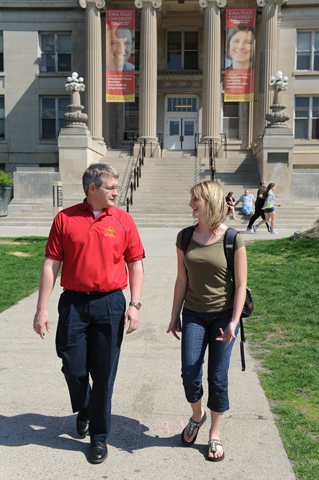
Charting The Course For Academic Success
Mike Retallick’s door is always open. The assistant professor of agricultural and life sciences education and studies advises more than 80 students annually, in addition to his research and teaching responsibilities. Any number of his advisees could drop by in a given day. And they do.
Retallick (’05 PhD agriculture and life sciences education) is one of 135 faculty advisers in the college. Together with another 13 full-time staff advisers they help agriculture and life sciences students navigate through their ISU experience.
For each advisee Retallick is the person who reviews their course schedule to be sure they are meeting degree requirements. He helps them identify and prepare for their internship and student teaching experiences. He intervenes when students are headed for academic probation and offers congratulations when they make the dean’s list. He processes course substitutions and makes sure his students meet university and departmental deadlines.
Retallick says that when entering college many students aren’t prepared for balancing their newfound independence with coursework. That’s where he comes in. He helps students learn to study and manage their daily lives, but he also encourages them to take their college experience a step further.
“I challenge them to get the most complete experience while at Iowa State. Our grads are highly sought after, but a degree on a wall should not be their end goal,” Retallick says. “Students should get the most out of each opportunity and differentiate themselves through clubs, leadership roles, internships, study abroad. It is the entire package that sets our students apart.”
Another major role Retallick and other advisers play is helping students handle the challenges life throws at them while they work on their degree. He connects students with campus resources such as student counseling, student health, financial aid and the academic success center.
“It is key as an adviser to be upfront, honest and frank with your advisees,” he says. “It helps them to know what to expect and makes their time on campus less scary.”
According to his advisees Retallick does just that. Transfer student Rachael Emig considers Retallick as the most influential person in her college experience.
“Dr. Retallick is always available to answer any question I have quickly and clearly, and I feel like I could ask him any question,” she says. “He helped me solidify my decision to major in agricultural education and have the smoothest possible transition to Iowa State.”
The toughest part of his job, Retallick says, is there are no easy answers.
“My first answer to many questions is ‘it depends,’” he says. “Every situation and every student is unique and policies and procedures can be interpreted differently.”
He admits it can also be difficult to balance his research and teaching load with the number of advisees he currently carries. But, that challenge is also what drives him.
“These students are what recharge my batteries. I enjoy the one-on-one teachable moments that come with advising,” he says. “You just don’t find that in the classroom.”
Advising the Advisers
The college launched the Louis Thompson Advising Academy in 2011. The academy, named in honor of the late agronomy professor and associate dean known for advising excellence, promotes the professional, individual and academic development of students through a mentoring relationship with an academic adviser.
Retallick is among the 25 faculty members of the academy who earned acceptance by receiving at least one college or university advising award.
David Acker, associate dean for academic and global programs, says the academy will help the college make further strides in becoming the best student advising program on campus.
“At its core the academy is about helping students reach their potential and maximize success inside and outside the classroom,” Acker says.
The academy was created based on recommendations from the college’s Future of Academic Programs Task Force and Academic Affairs Committee with support from the Iowa State University Agricultural Endowment Board.
“It takes time, it takes patience and it takes a caring attitude to serve students in this capacity,” Acker says. “This highly experienced group will provide excellent guidance and counsel on how to maintain and improve our tradition of excellence in advising.”



